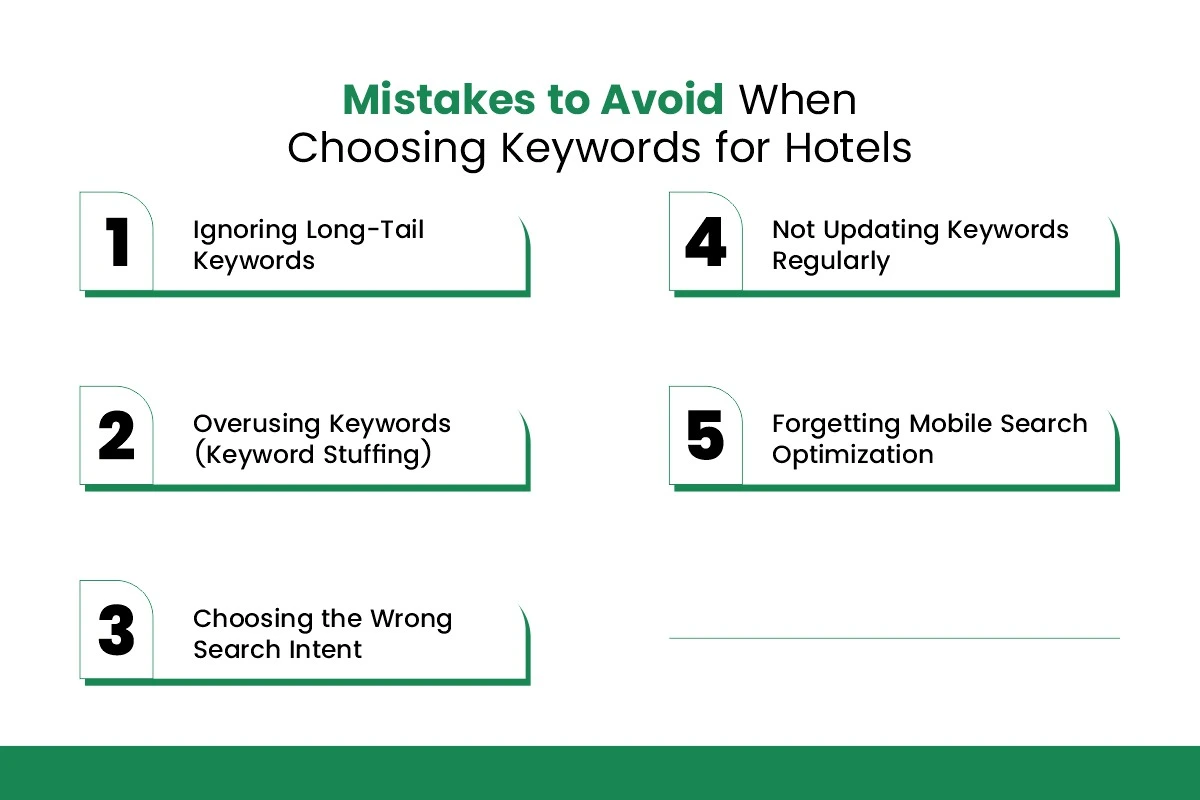#1 SEO Company Dubai
#1 SEO Company Dubai
Sun-Thu: 10 AM to 7 PM - Sat-Fri: Closed

Hotels face intense competition in the market while Google search engines remain the main tool for visitors to discover their preferred accommodations. Travelers usually start their hotel search from a simple search query, which helps them determine their vacation type
A properly designed keyword approach generates more organic traffic, increases direct reservations, and decreases dependence on online distribution channels such as Booking.com and Expedia.
In this blog, you’ll learn a step-by-step process for finding the best and right keywords for your hotel to improve visibility and online success.
Keyword research for hotels is the process of identifying the most relevant words and phrases that potential guests type into search engines whenever they are looking for hotels. Hotels should implement specific search keywords that allow them to create content that matches guests’ needs and help them locate and book their accommodations easily.
Appropriate keyword selection enhances hotel SEO. When you understand hotel guest requirements, use tools like Google Keyword Planner to select search keywords that include "budget hotels" and "luxury resorts". A hotel can achieve an advantage by analyzing long-tail keywords combined with seasonal trends and monitoring keyword performance.
Hotels should properly conduct keyword research because it stands as an essential element for hotels to optimize their search engine performance.
By following these 10 strategies, hotels can identify the best keywords to improve visibility and increase direct bookings.
The search behavior of hotel guests depends on multiple elements, which include their travel reason and spending capacity, and desired location. Knowledge about your target audience enables you to pick keywords that exactly meet their requirements.
Examples: Travelers search for budget stays near BTS stations in Bangkok, luxury resorts in the Maldives with private villas, or business hotels in London with Wi-Fi and conference facilities.
To start, basic keywords focus on identifying three aspects: hotel classification, geographical location, and available services. These basic keywords form the basis for specific keyword research, which attracts users from multiple demographics.
Examples: Keywords like "Hotels in Dubai" attract those seeking lodging in the city, while "Best honeymoon resorts in the Maldives" appeals to couples seeking romantic getaways, and "Pet-friendly hotels in Los Angeles" target travelers with pets.
Keyword research tools help hotels find valuable keywords by providing insights into search volume, competition, and trends. These tools make it easier to select the right keywords that can drive more traffic and bookings.
Examples: Hotels can use Google Keyword Planner to find high-volume keywords like "luxury resorts in Bali," Ubersuggest for high-converting terms like "romantic getaways in Santorini," and SEMrush for competitive insights like "business-friendly hotels in New York."
Understanding the intent behind a keyword helps hotels create content that aligns with what travelers are looking for. Keywords can be categorized based on the user's search intent.
Examples: “Best time to visit Paris for a vacation" is an informational keyword for travel advice, "Hilton hotels in Las Vegas" is a navigational keyword for a specific hotel chain, and "Book budget hotel in Rome" is a transactional keyword indicating intent to make a reservation.
Reviewing what search terms lead people to competitive hotel websites enables hotels to understand their competitive search market. The investigation enables hotels to pursue analogous search words or spots in the rankings that remain available for acquisition.
Examples: A luxury resort in Bali targets "beachfront hotels with private pools" to compete, a boutique hotel in Paris optimizes for "Eiffel Tower view" to rival competitors, and business hotels in New York adjust their strategy after finding competitors ranking for "hotels near Times Square with meeting rooms."
Specific keyword phrases that contain multiple words offer decreased market competition while providing improved chances of consumer conversion. The choice of specific keywords proves useful since they help businesses draw focused traffic.
Examples: Honeymooners in Bali prefer beachfront hotels with private pools, business travelers in New York seek hotels with Wi-Fi and meeting spaces, and visitors in Paris choose boutique hotels with scenic Eiffel Tower views.
Google provides users with relevant keyword recommendations based on actual search engine inquiries. This strategic method enables hotel owners to identify keywords that guests currently search for in Google.
Examples: When searching for hotels in Bali, users see options like those near the airport or with infinity pools, while "luxury hotels in Dubai" may autocomplete to "with a private beach," and "hotels near Disneyland" often includes results offering free shuttle service.
The volume of hotel reservations rises and falls according to seasonal patterns that affect related keyword popularity. The analysis of these temporary market changes enables hotels to improve their keyword strategies throughout different seasons.
Examples: People search for "Christmas vacation hotels in Europe" from October to December, "Summer beach resorts in Thailand" peak in searches from March to May, and demand for ski accommodations in Switzerland is highest from November to February.
Team members should analyze keyword performance after creating the keyword list to develop better SEO decisions.
Keyword trends fluctuate throughout time, during which SEO operates continuously. Hotel websites benefit from competitive performance when keyword performance is regularly monitored.
The correct selection of appropriate keywords enables hotels to boost their online presence while they attract more direct reservations across different search patterns.
Here’s why keyword research is important for hotels: :
Choosing the correct keywords provides better visibility for your hotel, but wrong keyword selection leads to reduced SEO success.

Here are 5 common keyword research mistakes that hotels should avoid, along with solutions to fix them:
Several hotels around the world only target popular short keywords, which include "Hotels in New York" alongside "Luxury Hotels." Due to high competition, these search positions are difficult to attain. Traveler searches do not align completely with these particular keywords. Hotels should utilize specific long-tail keywords as an alternative to generic keywords since they contain detailed information.
A better keyword would be "Affordable boutique hotels in Paris situated near the Eiffel Tower" instead of "Hotels in Paris." The use of detailed keyword combinations leads to better guest matching while causing booking numbers to increase.
Hotel marketing approaches overuse key phrases repeatedly with attempts to increase their search engine placement. Keyword stuffing creates distorted content that appears artificial to readers. Google search engines apply penalties to websites that perform keyword stuffing, which leads to reduced search rankings.
Content writing should include keywords that appear naturally in headings and descriptions and spread across the content. Using diverse related words with phrases throughout the content creates content that benefits both readers and usability.
Multiple keywords do not hold equivalent meaning according to users. A small percentage of searchers need information, while most users are ready for hotel bookings. Choosing incorrect keywords by hotels might result in a loss of potential bookings because visitors find no interest in what the hotel provides.
A user who searches "best places to visit in Thailand" requires travel suggestions rather than accommodation bookings. People answering a search query "beachfront hotels in Phuket with free breakfast" will likely make hotel reservations. Hotels need to select keywords that directly relate to the needs of their potential guests.
Search behavior evolves with time, thus influencing the way people search for hotels. A hotel will lose potential guests to competitor hotels whenever it continues using keywords that no longer match current search patterns.
Hotels currently benefit more from using keywords including "eco-friendly hotels" and "pet-friendly hotels" because these phrases have gained popularity during the past few years. The process of periodically reviewing and updating keywords with current market trends will help hotels maintain their position in search results.
Mobile devices serve as the primary instruments by which most visitors browse hotels for reservations. Hotels that neglect mobile search optimization on their website and keywords lose customers to numerous potential bookings.
The majority of users execute location-oriented search requests such as "hotels near me" along with "best budget hotels in London tonight." The strategic use of mobile-friendly search terms combined with fast website loading for smartphones provides hotels with an opportunity to catch potential guests.
Keyword research is an essential strategy for hotels aiming to increase visibility, attract more guests, and boost direct bookings. By understanding guest behavior, using research tools, and optimizing content with relevant keywords, hotels can stay ahead in a competitive market.
For expert SEO services tailored to hotels, BeinSEO provides solutions to enhance your hotel’s digital presence. Contact us today to improve your online rankings!
© copyright 2025 All rights reserved. BeinSEO